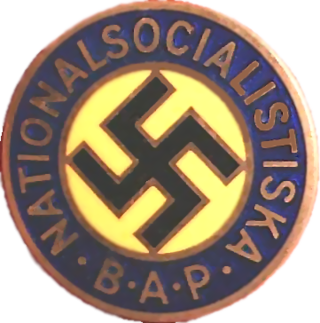
Czechoslovakia was a landlocked country in Central Europe, created in 1918, when it declared its independence from Austria-Hungary. In 1938, after the Munich Agreement, the Sudetenland became part of Nazi Germany, while the country lost further territories to Hungary and Poland. Between 1939 and 1945, the state ceased to exist, as Slovakia proclaimed its independence and Carpathian Ruthenia became part of Hungary, while the German Protectorate of Bohemia and Moravia was proclaimed in the remainder of the Czech Lands. In 1939, after the outbreak of World War II, former Czechoslovak President Edvard Beneš formed a government-in-exile and sought recognition from the Allies.

The Social Democratic Party of America (SDP) was a short-lived political party in the United States established in 1898.
The Socialist Solidarity Network was a grouping of socialists in the United Kingdom most of whom were former members of the Socialist Party. They supported the Socialist Alliance in England and support the Scottish Socialist Party in Scotland.
The National Socialist Program, also known as the 25-point Program or the 25-point Plan, was the party program of the National Socialist German Workers' Party. Adolf Hitler announced the party's program on 24 February 1920 before approximately 2,000 people in the Munich Festival of the Hofbräuhaus and within the program was written "The leaders of the Party swear to go straight forward, if necessary to sacrifice their lives in securing fulfilment of the foregoing points" and declared the program unalterable. The National Socialist Program originated at a DAP congress in Vienna, then was taken to Munich, by the civil engineer and theorist Rudolf Jung, who having explicitly supported Hitler had been expelled from Czechoslovakia because of his political agitation.

Samyukta Socialist Party, was a political party in India from 1964 to 1974. SSP was formed through a split in the Praja Socialist Party (PSP) in 1964. In 1965, Ram Manohar Lohia merged his Socialist Party (Lohia) with SSP and contested in 1967 Indian general election. In 1972, SSP was reunited with PSP, forming the Socialist Party. But in December 1972, SSP was recreated after the split in Socialist Party. One faction of SSP led by Madhu Limaye and George Fernandes wanted to merge with PSP but another faction led by Raj Narain resisted the merger with PSP.

The Praja Socialist Party, abbreviated as PSP, was an Indian political party. It was founded in 1952 when the Socialist Party, led by Jayaprakash Narayan, Rambriksh Benipuri, Acharya Narendra Deva and Basawon Singh (Sinha), merged with the Kisan Mazdoor Praja Party led by J. B. Kripalani.

The Calcutta flag was one of the first unofficial flags of India. It was designed by Sachindra Prasad Bose and Hemchandra Kanungo and unfurled on 7 August 1906 at Parsi Bagan Square, Calcutta. The "flag of Indian independence", which was hoisted by Madam Bhikaji Cama at the International Socialist conference in Stuttgart, Germany, was based on Calcutta flag.

The Communist Party of Kurdistan is a banned political party in Turkey, founded in 1982 as the Kurdish branch of the Communist Labour Party of Turkey (TKEP). Between 1980 and 1982, the TKEP had a Kurdistan Autonomous Organization. In 1990, the KKP became an independent party. The KKP is led by Mehmet Baran.

The Swedish National Socialist Farmers' and Workers' Party was the first Nazi organization in Sweden.
The Beiträge zur Geschichte der deutschen Sprache und Literatur is a German academic journal publishing articles on German language and literature. The particular focus is on the older periods and on the history and development of the German language.

German Social Union was a political party founded in West Germany in 1956 by Otto Strasser, the founder of the Black Front. Founded after Strasser's return to Germany, it was dissolved in 1962.

The Socialist Equality Party is a minor Trotskyist political party in Germany.
Social democracy is a political, social, and economic philosophy within socialism that supports political and economic democracy and a gradualist, reformist and democratic approach towards achieving socialism. In modern practice, social democracy has become mainly capitalist, with the state regulating the economy in the form of welfare capitalism, economic interventionism, partial public ownership, a robust welfare state, policies promoting social equality, and a more equitable distribution of income.
Fronten was a biweekly Norwegian newspaper.

Le Populaire was a socialist daily newspaper published in France. It was the main organ of the French Section of the Workers' International (SFIO) and, briefly, of the Socialist Party (PS).
The Polish Socialist Party of the Prussian Partition, sometimes Polish Socialist Party in Prussia - was a Polish political party.

Jacobin is an American socialist magazine based in New York. As of 2023, the magazine reported a paid print circulation of 75,000 and over 3 million monthly visitors.

The Socialist Labor Party (SLP) is a political party in the United States. It was established in 1876, and was the first socialist party formed in the country.
The International Union of Socialist Youth (IUSY) is an international youth labour organization, whose activities include publications, supporting member organizations and organization of meetings. Originally named the Socialist Youth International, the union was formed at the 1907 International Socialist Congress at Stuttgart as the youth wing of the Second International.

Karl Johann Kautsky was a Czech-Austrian philosopher, journalist, and Marxist theorist. A leading theorist of the Social Democratic Party of Germany (SPD) and the Second International, Kautsky advocated orthodox Marxism, which emphasized the scientific, materialist, and determinist character of Karl Marx's work. This interpretation dominated European Marxism for two decades, from the death of Friedrich Engels in 1895 to the outbreak of World War I in 1914.













